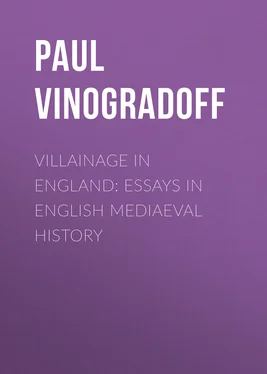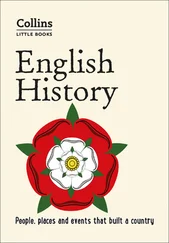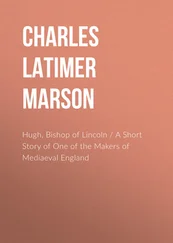Paul Vinogradoff - Villainage in England - Essays in English Mediaeval History
Здесь есть возможность читать онлайн «Paul Vinogradoff - Villainage in England - Essays in English Mediaeval History» — ознакомительный отрывок электронной книги совершенно бесплатно, а после прочтения отрывка купить полную версию. В некоторых случаях можно слушать аудио, скачать через торрент в формате fb2 и присутствует краткое содержание. Жанр: foreign_prose, Юриспруденция, История, foreign_edu, foreign_antique, на английском языке. Описание произведения, (предисловие) а так же отзывы посетителей доступны на портале библиотеки ЛибКат.
- Название:Villainage in England: Essays in English Mediaeval History
- Автор:
- Жанр:
- Год:неизвестен
- ISBN:нет данных
- Рейтинг книги:4 / 5. Голосов: 1
-
Избранное:Добавить в избранное
- Отзывы:
-
Ваша оценка:
- 80
- 1
- 2
- 3
- 4
- 5
Villainage in England: Essays in English Mediaeval History: краткое содержание, описание и аннотация
Предлагаем к чтению аннотацию, описание, краткое содержание или предисловие (зависит от того, что написал сам автор книги «Villainage in England: Essays in English Mediaeval History»). Если вы не нашли необходимую информацию о книге — напишите в комментариях, мы постараемся отыскать её.
Villainage in England: Essays in English Mediaeval History — читать онлайн ознакомительный отрывок
Ниже представлен текст книги, разбитый по страницам. Система сохранения места последней прочитанной страницы, позволяет с удобством читать онлайн бесплатно книгу «Villainage in England: Essays in English Mediaeval History», без необходимости каждый раз заново искать на чём Вы остановились. Поставьте закладку, и сможете в любой момент перейти на страницу, на которой закончили чтение.
Интервал:
Закладка:
Villainage by birth.
We meet discrepancies and confusion at the very threshold in the treatment of the modes in which the villain status has its origin. The most common way of becoming a villain was to be born to this estate, and it seems that we ought to find very definite rules as to this case. In truth, the doctrine was changing. Glanville (v. 6) tried in a way to conform to the Roman rule of the child following the condition of the mother, but it could not be made to work in England, and ever since Bracton, both common law and jurisprudence reject it. At the close of the Middle Ages it was held that if born in wedlock the child took after his father 57 57 Littleton, sect. 187. Cf. Fortescue, 'De laudibus legum Angliae,' c. 42.
, and that a bastard was to be accepted as filius nullius and presumed free 58 58 Littleton, sect. 188.
. Bracton is more intricate; the bastard follows the mother, the legitimate child follows the father; and there is one exception, in this way, that the legitimate child of a free man and a nief born in villainage takes after the mother 59 59 Bracton, ff. 5, 193, b.
. It is not difficult to see why the Roman rule did not fit; it was too plain for a state of things which had to be considered from three different sides 60 60 I need not say that there were very notable variations in the history of the Roman rule itself (cf. for instance, Puchta, Institutionen, § 211), but these do not concern us, as we are taking the Roman doctrine as broadly as it was taken by medieval lawyers.
. The Roman lawyer merely looked to the question of status and decided it on the ground of material demonstrability of origin 61 61 Mater certa est. Gai. Inst. i. 82.
, if such an expression may be used. The Medieval lawyer had the Christian sanctification of marriage to reckon with, and so the one old rule had to be broken up into two rules—one applicable to legitimate children, the other to bastards. In case of bastardy the tendency was decidedly in favour of retaining the Roman rule, equally suiting animals and slaves, and the later theory embodied in Littleton belongs already to the development of modern ideas in favour of liberty 62 62 See Fitz. Abr. Villenage, pl. 5 (43 Edw. III): 'Ou il allege bastardise pur ceo qe si son auncestor fuit bastard il ne puit estre villein, sinon par connusance.' There was a special reason for turning the tables in favour of bastardy, which is hinted at in this case. The bastard's parents could not be produced against a bastard. He had no father, and his mother would be no proof against him because she was a woman [Fitz. Abr. Vill. 37 (13 Edw. I), Par ce qe la feme ne puit estre admise pur prove par lour fraylte et ausi cest qi est demaunde est pluiz digne person qe un feme]. It followed strictly that he could be a villain by confession, but not by birth. The fact is a good instance of the insoluble contradictions in which feudal law sometimes involved itself.
. In case of legitimacy the recognition of marriage led to the recognition of the family and indirectly to the closer connexion with the father as the head of the family. In addition to this a third element comes in, which may be called properly feudal. The action of the father-rule is modified by the influence of territorial subjection. The marriage of a free man with a nief may be considered from a special point of view, if, as the feudal phraseology goes, he enters to her into her villainage 63 63 Bracton, f. 5: 'Servus ratione qui se copulaverit villanae in villenagio constitutae.' Bract. Note-book, 1839: 'Juratores dicunt quod predictus Aluredus habuit duos fratres Hugonem [medium] medio tempore natum et Gilibertum postnatum qui nunc petit, set Hugo cepit quamdam terram in uillenagio et duxit uxorem [uillanam] et in uillenagio illo procreauit quemdam filium qui ad huc superest.... Et bene dicunt quod … iste Gilibertus propinquior heres eius est, ea racione quod filius Hugonis genitus fuit in uillenagio.'
. By this fact the free man puts his child under the sway of the lord, to whose villainage the mother belongs. It is not the character of the tenement itself which is important in this case, but the fact of subjection to a territorial lord, whose interest it is to retain a dependant's progeny in a state of dependency. The whole system is historically important, because it illustrates the working of one of the chief ingredients of villainage, an ingredient entirely absent from ancient slavery; whereas medieval villainage depends primarily on subjection to the territorial power of the lord. Once more we are shown the practical importance of the manorial system in fashioning the state of the peasantry. Generally a villain must be claimed with reference to a manor, in connexion with an unfree hearth; he is born in a nest 64 64 Y.B. 30/31 Edw. I, p. 167 sqq.: 'Usage de Cornwall est cecy qe la ou neyfe deyt estre marier hors de maner ou ele est reseant, qe ele trovera seurte … de revenir a son ny ov ses chateux apres la mort de son baroun.' Bracton, f. 26, 'Quasi avis in nido.'
, which makes him a bondman. The strict legal notion has to be modified to meet the emergency, and villainage, instead of indicating complete personal subjection, comes to mean subjection to a territorial lord.
This same territorial element not only influences the status of the issue of a marriage, it also affects the status of the parties to a marriage, when those parties are of unequal condition. Most notable is the case of the free wife of a villain husband lapsing into servitude, when she enters the villain tenement of her consort; her servitude endures as long as her husband is in the lord's power, as long as he is alive and not enfranchised. The judicial practice of the thirteenth century gives a great number of cases where the tribunals refuse to vindicate the rights of women entangled in villainage by a mesalliance 65 65 Bract. Note-book, pl. 702: 'Nota quod libera femina maritata uillano non recuperat partem alicuius hereditatis quamdiu uillanus uixerit.'
. Such subjection is not absolute, however. The courts make a distinction between acquiring possession and retaining it. The same woman who will be refused a portion of her father's inheritance because she has married a serf, has the assize of novel disseisin against any person trying to oust her from a tenement of which she had been seised before her marriage 66 66 Bract. Note-book, pl. 1837: 'Nota quod mulier que est libera uel in statu libero saltem ad minus non debet disseisiri quin recuperare possit per assisam quamuis nupta fuerit uillano set hereditatem petere non poterit.' Bract. Note-book, pl. 1010: 'Et uillani mori poterunt per quod predicte sorores petere possint ius suum.' Fitzherb. Villen. 27 (P. 7 Edw. II.): 'Les femmes sont sans recouverie vers le seignior uiuant leur barons pur ce que ils sont villens.' Cf. Bracton, f. 202.
. The conditional disabilities of the free woman are not directly determined by the holding which she has entered, but by her marital subordination to an unfree husband ('sub virga,' Bract. Note-book, pl. 1685). For this reason the position of a free husband towards the villainage of his wife a nief is not exactly parallel. He is only subject to the general rules as to free men holding in villainage 67 67 Another instance of the influence of marriage on the condition of contracting parties is afforded by the enfranchisement of the wife in certain cases. The common law was, however, by no means settled as to this point. Y.B. 30/31 Edw. I, p. 167 sqq.: 'La ou le seygnur espouse sa neyfe, si est enfranchi pur toz jurs; secus est la ou un homme estrange ly espose, qe donk nest ele enfraunchi si non vivant son baroun, et post mortem viri redit ad pristinum statum.' Fitzherb. Vill. 21 (P. 33 Edw. III): 'Si home espouse femme qe est son villein el est franke durant les espousailles. Mes quand son baron est mort el est in statu quo prius, et issint el puis estre villein a son fils demesne.' It is quite likely that gentlemen sometimes got into a state of moral bondage to their own bondwomen, and were even led to marriage in a few instances, but the law had not much to feed upon in this direction, I imagine.
. In any case, however, the instances which we have been discussing afford good illustrations of the fact, that villainage by no means flows from the simple source of personal subjection; it is largely influenced by the Christian organisation of the family and by the feudal mixture of rights of property and sovereignty embodied in the manorial system.
Интервал:
Закладка:
Похожие книги на «Villainage in England: Essays in English Mediaeval History»
Представляем Вашему вниманию похожие книги на «Villainage in England: Essays in English Mediaeval History» списком для выбора. Мы отобрали схожую по названию и смыслу литературу в надежде предоставить читателям больше вариантов отыскать новые, интересные, ещё непрочитанные произведения.
Обсуждение, отзывы о книге «Villainage in England: Essays in English Mediaeval History» и просто собственные мнения читателей. Оставьте ваши комментарии, напишите, что Вы думаете о произведении, его смысле или главных героях. Укажите что конкретно понравилось, а что нет, и почему Вы так считаете.












